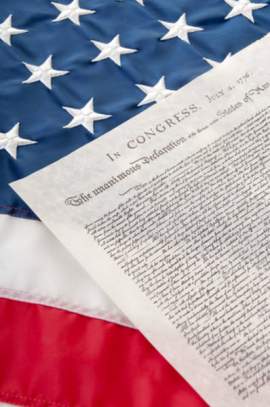
Who Is James Madison

Popular In Constitution
Purpose Of Lifetime Appointment And Pros And Cons Enumerated Powers Bicameral Legislature Background Article 3 Of The Constitution We The People 1st Amendment Who Wrote The Constitution Judicial Review Equal Protection Clause 5th Amendment 10th Amendment Three Fifths Compromise
James Madison was an innovative political philosopher and the 4th President of the United States of America. Madison is one of the more unique Founding Fathers, for his interpretation on the inclusion of individual rights in the Constitution drastically shifted.
Known as the "Father of the Constitution", Madison was the principle author of the Bill of Rights and a leader in the first United States Congress. The fluctuation in Madison's ideology stemmed from his jump from the Federalist Party to the Anti-Federalist Party. Madison originally was a principle author of the Federalist Papers and stressed the importance of an appropriate balance of powers between the Federal and State governments. In many of the Federalist publications Madison claimed that a large country with an assortment of interests could better support republican values, more so than a fragmented country with individual governments. Although this interpretation was ignored at the time, the viewpoints expressed were adopted by the Pluralist Party in the 20th Century.
Along with John Jay and Alexander Hamilton,
Madison sought to overhaul the Articles of Confederation and alter the document’s
drastic separation of powers between the State and central governments. At the
Philadelphia Convention in 1787, the often shy Madison proposed the Virginia
Plan, which in essence was the establishment of the modern three-branch Federal
system. Madison's intent in congruency with the Federalist platform was to create a powerful and efficient central
government capable of overruling State actions.
During
ratification meetings and open forums, Madison consistently argued for the
proposed 3-branch system and claimed that individual liberties or empowered State
governments would impede the long term goals of a newly founded nation. In the
late 1780s, Patrick Henry and George Mason desired an inclusion of individual
liberties (the Bill of Rights) into the United States Constitution. These men
as well as other supporters of the Bill of Rights were considered opposition to
James Madison and prominent Federalist leaders. Although the stances seemed
concrete, Madison later acknowledged the points raised by the Anti-Federalists
and quickly focused his energies on authoring a set of Amendments which
guaranteed the individual definitive liberties.
The initial stance taken by Madison revolved
around the separation of powers and the need for a fully functional Federal Government.
Madison originally claimed that the inclusion of individual rights
was superfluous; the original Constitution inherently offered such rights
through interpretation. The influential politician felt as though individual
rights were not as crucial as empowering the central government. Madison also
believed that State governments already offered a series of individual freedoms
and their success generally proved futile.
The Democracy of America proved to be the Federalist Party’s largest barrier. In order for the original Constitution to be ratified the states had to agree on the principles outlined in a 3/4 majority vote. Although his intentions are still cloudy, many believe that Madison eventually authored the Bill of Rights to appease the Anti-Federalist Party in a compromise to ratify the three-branch Federal system and original Constitution.
James
Madison offered a series of 12 proposed Amendments in June of 1789. The
proposed package contained a plethora of individual liberties that still
preside over society today. The proposal was later ratified to 10 Amendments
and the official United States Bill of Rights was included in the Constitution
in 1791. Whatever his intentions may have been, Madison authored arguably the
most significant set of individual freedoms found in the United States’
principle legal doctrine.
James Madison's drastic political shift became
more conspicuous after the adoption of the Bill of Rights. While serving in
Congress Madison joined forces with Thomas Jefferson in an attempt to limit the
power of the Federal Government. Madison, along with Anti-Federalist Party
members, grew horrified at George Washington and Alexander Hamilton's efforts
to build a government reminiscent of the abusive and tyrannous British
Parliament.
Madison and Jefferson shared similar viewpoints up until 1812, where the war exposed America's ineptness in the form of a weak centralized government. Although historians have disagreed on Madison's political vacillations, his efforts, accomplishments (most notably the Bill of Rights), and impact on American society cannot be ignored.
NEXT: John Adams





















